interview by Michael McCarthy
Still Corners is a duo consisting of Greg Hughes and Tessa Murray. They’ll be releasing their gorgeous fourth album, Slow Air, via their own Wrecking Light label on August 17th of this year. It’s an intoxicating collection of songs that are just perfect for nighttime listening. Their tracks have slow to mid-tempo, but driving beats, which are very appropriate because the album is perhaps best appreciated while driving around in the evening. I’d recommend listening to it while out for a joyride during sunset. That’s what their atmospheric music, which comes courtesy of multi-instrumentalist Greg, makes me envision doing. Its lush soundscape has me wishing I still resided in California so I could listen to it while driving down the Pacific Coast Highway, soaking in the sight of Malibu Beach. Of course, with Tessa’s breath-taking and ethereal vocals floating above the music, you might envision angels descending from the clouds or double rainbows. Or perhaps you’ll imagine yourself riding a unicorn/Pegasus hybrid. You’re sure to envision something as their cinematic music makes its way from your speakers and into your brain, making it swirl around like a kaleidoscope, filling your head with as many colors as a Crayola 64 pack. Just turn their music on and bask in their warm sounds as you daydream or, perhaps, come down from a night of dancing. It will soothe your soul.
MM: I understand you’re now based out of Woodstock, New York. Does this mean you’ve both moved there?
GH: Yes, yes. We live here now. We moved from Austin in February.
MM: Is that where you are now, in New York?
GH: Yes. I imagine you’re getting some of this weather. It’s nice.
MM: Especially after all the heat and rain. So, going back a little bit, I know that Greg is originally from Arizona and Texas and that the two of you met on a subway platform in London. Are you from London, Tessa? And could either of you tell us about that chance subway meeting?
TM: I grew up about an hour outside London in a town called Tunbridge Wells, as is the way in the UK because it’s so small most people kind of end up living in London for a bit after university so we were both living in London and I guess got on a train that we thought was due to stop at London Bridge station but it didn’t stop there so we ended up on the platform in a place called Kidbrooke, which is in South East London. I didn’t know it that well. But it was not our destination that day. And we were twenty minutes before the next train back. So, I saw someone else a little bit annoyed and I said, “So, did you get on the wrong train, too?” And that was Greg. I was on my way to choir practice and when he found out he thought, maybe that’s a potential singer?
GH: So, we exchanged contact info and she came down to the studio and we did some demos and stuff and it just kind of went from there.
MM: So, did you become friends first and then decide to make music together or did the friendship happen because of the music?
GH: I think the friendship happened because of the music. Because we were working on that, toward that, so it just sort of naturally evolved.
MM: I hate to ask this, but I know our readers will wonder. Are you simply a musical duo or are you a couple, too?
GH: Just a musical duo.
MM: Have you gone by Still Corners from the beginning?
GH: Yeah, yeah. That was the original name and it just sort of stuck.
MM: Which one of you came up with it?
GH: I think it was me. I was reading a Robert Frost poem called New Hampshire and I came across that line and it just seemed to stick.
MM: Are you a big fan of poetry?
GH: I think so. I think we both like a bit of that. Yeah, yeah. I’d say yes.
MM: Were either of you in bands when you were growing up?
GH: No, but I was obsessed with bands. I listened to my sister’s albums all the time and started stealing them. And listening to my mom’s albums as well. So, I was sort of always interested. [to Tessa:] Same with you, I think?
TM: Yeah. I wasn’t really in bands but sang a lot and I studied music at high school. So, music was always there, and my dad has a good music collection, so I think I was kind of indoctrinated into good music tastes, which kind of helped permeate through what we do as well.
MM: Let me ask you both – what was the first album you bought with your own money?
GH: The first album I bought was a tape called She’s A Hotel Detective by They Might Be Giants. I think it was like their first demo and it’s totally impossible to find now. It’s pretty rare. That was mine.
TM: I bought a compilation tape called Untitled, which had various indie hits from the UK in the ’90s. To be honest, I don’t remember any of the songs off of that. But it had a really distinctive cover with these green eggs and then one red egg. That’s all I remember.
MM: Your first release was an EP called Remember Pepper? What’s the story behind that title?
GH: There’s a movie called The Daytrippers by a relatively unknown director named Greg Mottola, who’s definitely from the East Coast. It might be New York. It’s just about a family that goes into New York city together and the family is very East Coast and wonderful. The name of the dog is Pepper but the dog had died and the mom’s asking, “Do you remember Pepper?” And I just thought that was a cute sort of title.
MM: Now that you’re talking about it, I vaguely remember seeing it.
GH: Parker Posey is in it.
MM: Yeah, she’s awesome.
GH: She is. She’s great.
TM: I was just going to say when we were in London we did this rooftop show one night and screened Daytrippers. I can’t remember – did we tell people Remember Pepper was from that?
GH: Yeah. That was fun.
MM: Your new album was written in the hill county in Austin, Texas. Is that where you had lived in Texas, Greg?
GH: I was close by in Austin because I had went to school there. But we sort of were renting a place and, yeah, it was close to where I had originally been.
MM: And you set up your own studio there if I remember correctly?
GH: Yeah. There was this large room. I think it was 14 by 35 feet. It was very big so there was plenty of room to set up a whole drum kit and everything. And then I tore it all down and set it all up in a room here in Woodstock.

MM: How did you learn music production?
GH: Just really slowly listening to a lot of Steve Albini records. Getting that sort of DIY spirit and calling up studios and realizing it was way too much money for me to do anything worthwhile there. So, I think every record [of ours] gets probably a little more hi-fi. And then I can sort of unlearn all that and make a very trashy record.
MM: Your first two albums were on Sub Pop, but your new album is on your own Wrecking Light label. Why the change?
GH: Well, we’re still with Sub Pop for publishing, but I think we just decided to break off on our own. It made sense in certain different areas. Like streaming’s picking up with us and some of our music and so we just thought it out, this might be a good chance to try something on our own. And we quite like handling all the business aspects of it and finding places to print albums and getting down and dirty with all that stuff. We actually enjoy that. So, we just thought it would be good to switch. I think publishing was still a really good thing with them so we’ve maintained that relationship. They’re all cool people there.
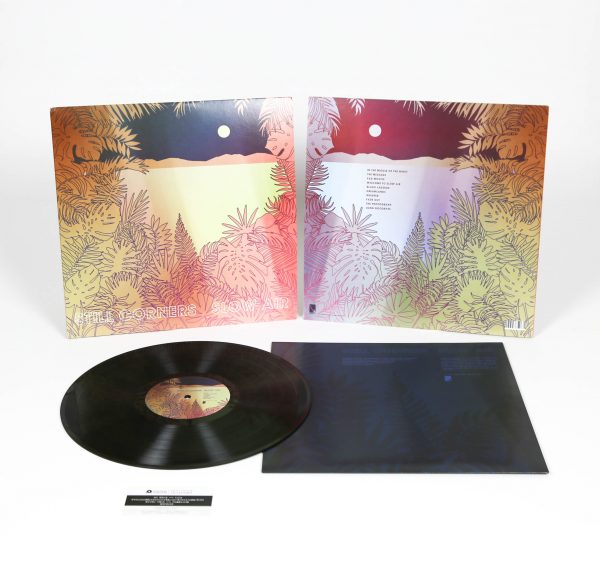 MM: As far as physically buying an album goes, vinyl seems to rule these days. Are all of your albums available on vinyl?
MM: As far as physically buying an album goes, vinyl seems to rule these days. Are all of your albums available on vinyl?
GH: Yeah, I think all of them are.
TM: I think that Sub Pop has been reprinting Strange Pleasures at the moment because that one sold out temporarily, but it will be back in stock soon. But we’ve got the new album on really nice looking vinyl. So, I’m really excited for people to have that.
MM: So, are either of you big vinyl collectors at all?
GH: Yeah. I mean, we both love listening to albums. We’ve got a really nice turntable. So, I would say yeah, we are.
MM: You have thousands and thousands of listeners on Spotify. Did that all happen gradually, or did one of your singles get a ton of hype, or did Spotify put you on one of their official playlists? How did that happen?
GH: Well, we’ve been around a while so I think it just naturally happened. We’ve got a few bangers in there that get a lot of play so that adds to it. But I think that overall it’s been a slow build, really.
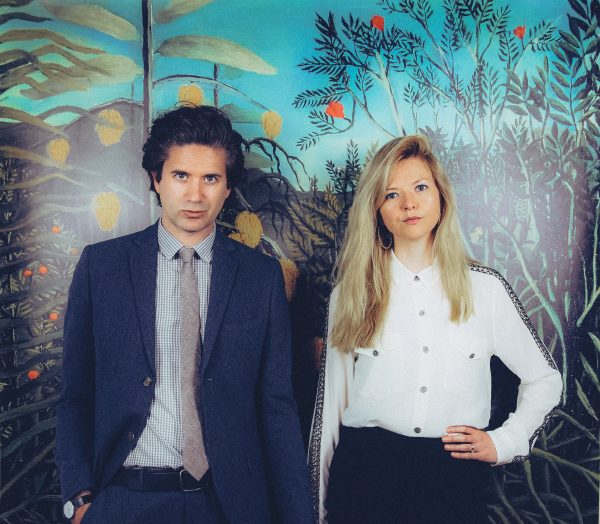
MM: I really like the cover art you’ve used, including the new album. Who did the new one?
GH: That’s a guy named Scott Campbell. He did our first two albums for Sub Pop. And then we sort of broke away to do a slightly different album [cover] with our third album. And then we came back because it seemed he would do well with this sort of material. Yeah, he’s amazing. He does lots of other great stuff as well.
MM: Do you give him any ideas insofar as a theme or anything goes before he makes the cover? Or does he just listen to the album and get a vibe?
GH: I think it varies. Like with this one we sent him some sort of ideas that we thought, this will be cool. And he took the ball and ran with it.
TM: And it came together really quickly. I guess sometimes it’s an exhaustive process, but with this one, it was like pretty much the first thing he sent over [that] we loved and then he made a few tweaks, developing the colors and concept for the different media. It was a really easy process and it’s really fun working with him.
MM: Just out of curiosity, why have neither of you been on the covers?
GM: I don’t know. I think we’re too shy for that.
TM: We prefer something beautiful that people will want to look at other than us, I think.
MM: How is the songwriting handled? I’d read that Greg was the songwriter, but I’m assuming that Tessa must give more input now than when you first started out. So, how’s it all work?
TM: It’s kind of evolved over time. Greg had kind of been working on the project and I joined and we built it up together. Early on, there were more songs he had been thinking about for a while so it was more me helping out and making sure that it made sense for my voice. But the most recent album, definitely, I’ve been involved probably the most on the vocal parts. So, it still tends to be Greg doing instrumentation and stuff. But quite often I’ll come up with an idea and we’ll run with it. And I think we – with this record – tried to go with our instinct and let it happen. And the creative juices were flowing, so it came quite easily.
MM: When you’re writing, do you ever make beats with Pro-Tools or something similar? Or did you go straight to the drums with the new album?
GH: Usually, I’ll use a holding pattern that I’ll just tap out with my fingers to get the general feel for it and then I’ll move over to the live kit.
MM: And was it you who played the drums on the new album?
GH: Yes, yes.
MM: So, you can play everything then?
GH: Everything, a little bit. In a simple way.
MM: Are you self-taught?
GH: Yes.
MM: What program do you use when you’re tracking the songs?
GH: I use two different ones. For the original, quick ideas I’ll start with Ableton because it’s super quick and dirty, but it’s not so great for properly recording using mics and stuff. So, as soon as I get a good idea I switch right over to Pro-Tools and I track it and finish it off from there.
MM: One of the things your press release stated is that you kept the mistakes to give it “a human feel and emotion.” Now, I’m more of an interviewer than a critic, but I didn’t notice any mistakes when I listened to it. So, could you give us one example of where there is one?
GH: Maybe, being a perfectionist, that’s more in my head. But, for example, on the first song that guitar – all the guitar parts in that except for the acoustic guitar – I couldn’t re-do again because I couldn’t get the right vibe and that was just, really, [that] the amp was just blown. The mic was not a very good mic and it was still a scratch idea but I just kind of went in. And there are a few little mistakes and stuff in there, but it just had the right feel. Maybe the timing is a bit off. And that happens throughout the record. There are sort of scratch ideas that I was just like, oh forget it [and left them]. Or maybe I blipped a little bit but instead of retaping it I just left it in. Stuff like that.
TM: And you learn that it doesn’t seem like a mistake after a while. But at the time you’re like, OK, we should come back to that. And I tried to go back to it, but what we did isn’t as good and we realized actually we didn’t need to.
MM: Your tracks obviously have many layers to them. How many tracks would you say the average song has?
GH: I really try not to go above twenty. On this album, I tried to pull back on some of the layers. The drum kit has probably five or six tracks on it alone, but that’s one instrument. I would say I try to get it between sixteen and twenty.
MM: It seems to me there’s more guitar on Slow Air than your previous releases. Or maybe that they’re not as lyrical as on the last album. Would you say that’s accurate?
GH: Yeah. I went back to the guitar after the third album, which was more of a mechanical and synthesized type of record. And I guess I’m traditionally a guitar player. So, it felt good to try that. And then I know we left space so some of those guitar parts could have some space around them. Not every part had vocals and stuff.
MM: I read that you used both new and old microphones on the album. Could you tell us about some of the ones you used?
GH: So, for the guitar, it’s probably more of a technical thing, but on the guitar we used a Manley Supercardio 8 tube microphone and combined that with a SM57 and kind of blended the two signals. And then on the vocals and stuff we’ll used an old BBC Mic called a Colt 40 38, which has a very nice, dark sound. I think it was originally meant for broadcasting, but it just really suits itself. It doesn’t have a big high range. It slips off. So, with Tessa’s vocals it gave them a kind of darker appeal, which we really thought worked on this album.
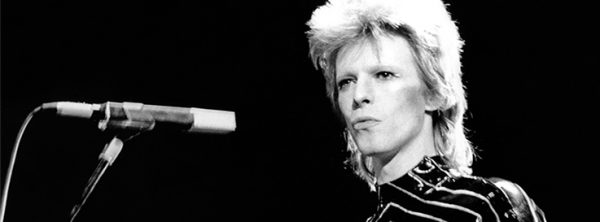
TM: And we’ve also got a Senheiser mic – the MD441 – and we used that on one or two. And that’s got a funny story behind it.
GH: Oh, yeah.
MM: What’s the story?
GH: We were in Frankfurt and I was looking for this special mic that looks like an Orwellian sort of future retro microphone. It’s used in the “Black Lagoon” video. Tessa is singing into it. It looks really cool and I know that Stevie Nicks traditionally used it on stage, which was very unusual. So, I was very interested in this mic. I was telling this guy about it and he goes, “Oh, there’s a local guy. This older, German gentlemen who fixes microphones and he’s got a vault full of all these parts.” He said, “If you want to get that mic, I’m sure he’ll have it.” Anyway, after the show, which was at about two A.M., this guy rolls up.
TM: A respectable, white-haired German guy.
GH: He’s got a long beard and he just produces this microphone and I got it for 250 euros, which was a steal. And we’ve kept that and used that. I think you [Tessa] used that microphone on the first song. It’s a really cool microphone and it sounds great, too.
MM: Listening to the lyrics, nighttime is a constant presence on the album. Would you say you’re more so night people than daytime people?
GH: Yeah, definitely. Lately, we’ve been getting up earlier to work on lots of stuff, but I think the nighttime kind of exudes an atmosphere. At least I like to work then and sort of come up with ideas.
TM: There’s so much more mystery at night. Moonlight and stars. And when it’s raining at night, it’s just so much cooler than when it rains during the day. I guess we try to evoke that kind of thing through this album.
MM: On “The Photograph” you’re looking at an old photo of a lover and reminiscing about how happy you were and wanting to go back and live it again. Is there someone in your past who you still yearn for when you see old photos of them? And do you find yourself looking at photographs often?
TM: I think we’ve both gone through phases like that in the past and kind of pining after love lost. It’s probably less of a current thing. But I love going through old photos. It just brings up so many memories and you can think about what you were like then and what people were like then or what a particular person was like. It can just come flooding back.
MM: I know you’re a duo, but do you have a live band that performs with you on tour?
TM: Yeah, we play with a live drummer and we also have a sound guy who travels with us to make sure that everything sounds good for the audience, which is really nice for us as well, because we can be sure that people are listening to something which is how we want it to sound. Sometimes you’re not in control of that if you’re using the house guy.
MM: What are their names?
TM: Our drummer is called Josh Halpern and our sound guy’s Al Dubois. And they’re both still in Austin, so we’ll be flying Josh up this month to start properly practicing for the tour.
MM: Does anyone contribute backing vocals when you perform live?
TM No, I use a pedal, which adds harmonies to certain bits and delays and things like that, which is cool and kind of organic. We like using that.
GH: I would, but I can’t sing. So…
MM: You have a tour going on right now, don’t you?
TM: It starts in early September.
MM: I was looking at the dates and there wasn’t a Boston date.
GH: Yeah, I don’t know. I think we’re still trying to work that out. I’m not sure why, but we’ve gotta get in touch and figure that out. We played at the Middle East last time, so that was great.
MM: We’re based out of the Boston area, that’s why I brought it up. Do you have any Boston stories or experiences that you could share with us?
GH: Well, I lived in a little town called Wilbraham in Massachusetts for five years when I was a kid and I used to go up to Boston. That was actually the first time I went to Chinatown. Or a Chinatown. It just completely blew my young, ten-year-old mind. I thought it was just brilliant. And so, yeah, I’ve always had a soft spot in my heart for Massachusetts.
TM: And I think our sound guy is originally from Boston. And maybe the second time we played in Boston we were playing at the venue where he actually worked when he was still living out there. When we started working with him he was like, “Oh, I wasn’t working that night but my colleague who was working got a copy of the CD and said to me, ‘I think you’ll like this.’” So, they spent that winter listening to our album. So, it’s a nice story.
GH: And my mom was born in Boston.
MM: Cool. Cool.
GH: She lived in Massachusetts until she was 19.
https://youtu.be/TQPssNNCRqk
MM: So, I saw your video for “The Trip” with Tilda Swinton in it. How did she come to be in it?
GH: That might be a fan video, actually. Yeah, because we haven’t made a video for “The Trip.” But there are a lot of people out there making videos for us. I actually haven’t seen that one and I do like Tilda Swinton so I’ll have to see that.
MM: I don’t know what the footage would be from then. She’s on a countryside and then she’s kind of crawling through this cave in a mountain. It looks like a professional video so you should check it out.
GH: Oh, definitely, I will.
TM: I would like to look at that.
MM: So, who directed the “Black Lagoon” video?
GH: That was just Tess and I. We had that song and we were out in that area on a road trip and we thought, let’s just film a bunch of stuff and stick it together and see what happens.
MM: What kind of camera did you use to film it?
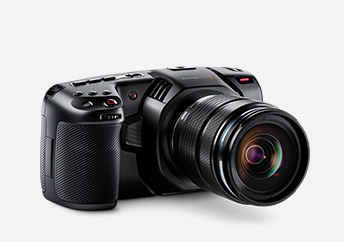
GH: It’s called a Blackmagic Pocket Cinema Camera made by Davinchi, I think. It’s a small camera – it’s very small – but it actually shoots in film definition. So, it looks good.
TM: And it’s quite good because it’s so small you can get away with filming in places where if you had a bigger camera you might get more attention and people might start asking about permits and things like that. [Laughs] We managed to avoid that side of things.
MM: Is that a certain highway or route that you’re driving on in “Black Lagoon”?
GH: The road? I don’t think so. It was more or less roads that we were on and we were like, oh, this is good, let’s use this road. We didn’t go to any road in particular. Once you’re out there, a lot of those places just look like that.
TM: I think we looked at it on Google maps on Google Earth so you can see what it looks like before going there. So, we kind of had a vague idea. OK, if we drive in that direction then it’s probably going to look good.
MM: Had you already moved to Woodstock prior to that trip? If not, what made you decide to settle in Woodstock as opposed to any of those scenic places?
GH: We were still in Austin at that stage. And I don’t know if we just have a travel bug at the moment where we keep wanting to move around, but we were looking for a place that was a little bit less hot. And we had seen Woodstock in this movie Peace, Love and Misunderstandings. It’s an OK film. It’s got Jane Fonda in it as kind of a hippie grandmother who smokes pot and stuff like that and it actually was all filmed in Woodstock. So, we saw it in the movie and thought it looked beautiful and we had been to Kingston and really liked it when we played at a local place called the BSP and so we just decided to just do it. Yeah.
TM: We liked the idea of being close to New York City as well because it’s a great place. We didn’t necessarily want to live in another big city, but being able to just kind of pop in is quite nice.
MM: Who directed the videos for “Lost Boys” and “Horses at Night,” if those are indeed official videos?
GH: Yes, those are and “Lost Boys” was us. We were just filming stuff and playing around with the video and decided to go with a negative of the image. And “Horses at Night” was our friend Lucy Dyson, who took a little bit I filmed and added her magicalness to it. She had also done our first videos ever called “Wish” and “Cuckoo.” She’s really talented and is living in Berlin at the moment.
MM: When I searched for you in my music library to bring up the new album I discovered that there’s a remix of Moby’s “Almost Home” that’s credited to Still Corners. Is that indeed you?
GH: Yeah. He got in touch to take a song of his that he had written and asked us to remix it. We usually don’t do remixes, just because I’m not such a big fan of remixes. I just never listen to them, really, for some reason. But it was him and he’s great and so we just said, oh, yeah, let’s do that. So, we did.
MM: Is that the only remix you’ve done for another artist?
GH: Yes. [Laughs] First and last, I think.
RANDOM QUESTIONS:
MM: If I was looking at your contract rider, what might I be surprised to find there?
GH: Um… I don’t think you would be surprised because we rarely, hardly put anything on there. You’d be surprised because it’s so little. It’s hummus, bread, water, and we say six beers. We’ve been on tour and you end up seeing this stuff being thrown away. Do we want to take these beers with us for the next night when we’ll be getting more beers?
TM: We like to give them away to our friends that we see. You’d be surprised that it was small.
MM: If you were on a big tour right now and had to check into a hotel using a fake name what would you use?
GH: I would use Dillinger. No last name.
MM: Tessa, do you have one?
TM: I would be Penelope Pitstop.
MM: Are either of you currently binge-watching anything?
GH: We just binge-watched Picnic at Hanging Rock. And Glow. So, we finished those off and they were both good.
MM: What are your all-time favorite series?
GH: I would say The Sopranos, Mad Men – I know there’s earlier stuff as well but I can’t think of…
TM: There’s a really good – I guess it would be classified as a mini-series – but the BBC did an adaptation of Tolstoy’s War and Peace a couple of years ago and that was really good.
GH: That was awesome. Oh, and Miss Marple from the ’80s was really good. And Sherlock Holmes. The one with Jeremy Brett. That’s one of my all-time favorite shows.
MM: Name a few movies you can watch again and again.
GH: We both really love the original Picnic at Hanging Rock. What else do we watch? Don’t Look Now, I think is a classic. Jaws. We really like Jaws a lot. And I think we watch Jaws once a year.
MM: Do you have any different ones, Tessa?
TM: The only one I can think of right now is really silly, which is Baby Boom.
GH: [Laughs] Oh yeah, Baby Boom.
MM: I don’t think I’ve seen that.
TM: It’s a movie to see to lift your mood.
GH: If you’re into the sort of ’80s silly films before everything got serious, Baby Boom is quite good. It’s with Diane Keaton. It’s solid.
MM: I’ll check it out. I was born in ’73 so I grew up in the ’80s and I like that kind of movies.
GH: Well, watch it and let us know what you think.
MM: What was the first concert you went to?
GH: I think the first concert that I went to was a band called NOFX, which was really hard, heavy music. I think that’s the first one I remember.
MM: What did you think of them?
GH: I thought it was crazy. It was very rowdy. There was a lot of moshing and I wasn’t really prepared for that. But it was fun.
TM: I went to a summer, outside gig. It was the Bootleg Beatles in my early teens and that was really fun. I don’t know how many Beatles cover bands there are out there touring, but these guys have quite a reputation in the UK and they put on a really good show. It was fun.
MM: What was the last concert you attended? Separately or individually?
GH: Actually, we went to an outdoor concert here in Woodstock at the Maverick Concert Hall, which is this amazingly beautiful concert [venue]. Half of it’s covered and half of it’s not and there’s natural acoustics in there. We saw a string quartet from New York. Somewhere in New York. These young people. It was great.
MM: How do you work past writer’s block?
GH: Um, we don’t really have writer’s block yet. We just ignore it when it comes up, I think.
MM: We’ve lost a lot of great artists during the past few years. Prince, Tom Petty, Bowie, and, of course, Chester Bennington and Chris Cornell more recently. Was there one particular artist’s death that hit you the hardest?
GH: I think both David Bowie and Tom Petty. It was pretty hard to take. Tom Petty because it was so sudden and unexpected. I think I had heard there were rumors that David Bowie might be ill. I think his was sad because, well, we had felt his music so deeply and then I think his last album was a particularly sad album. A difficult album to get through. When you listen to that and you think about him and his huge influence across so many decades, it’s hard not to get a bit emotional about it.
MM: What about you, Tessa? Whose death hit you the hardest?
TM: I’d have to agree with Greg on both of those. And I guess from a UK perspective George Michael was a big shock when he died. I think it was just around Christmas the year before last. That was a really sad one. And then all the stories came out about his philanthropic gestures. Sending big checks off to people and such. I don’t think people were really aware of that in the public domain before he died.
MM: If you could resurrect any one musician from the dead and they’d be happy to be back, who would you bring back?
TM: I would choose one of the artists who died when they were really young in the ’60s and ’70s. Like Jimi Hendrix or someone like that. Just to see what he’d do now in the current day music scene.
GH: I would say John Lennon because it was just awful how he went out. The whole world was just robbed, really, of that guy.
MM: Last question. If someone was giving you a million dollars to give to charity and it all had to go to one charity or cause, which would you give it to?
GH: I think I would do… Oh God, that’s hard. The first thought that came to my mind was children in need. Probably kids. Or what’s the disease that’s really awful?
MM: Cancer?
GH: Is it M.S.?
MM: Oh, yeah, M.S. is nasty. Parkinson’s is bad, too.
GH: There’s one I’m trying to think of.
TM: Cystic fibrosis?
GH: Oh, C.F., C.F. That’s a terrible one.
MM: What about you, Tessa?
TM: I just don’t think I can answer that question. I actually had a thing a few years ago [where] someone was like, oh, you should give some money to charity. Which charity should we choose? And I think I spent hours researching. And there are actually companies where their whole goal is to identify charities for donors to give to. There are just so many factors that come into play. So, I’m just going to skirt around and say it would probably take me a day, or a week’s research, to identify the charity. I can’t possibly do that right now.
Buy Still Corners’ Slow Air on vinyl from Amazon.
Buy Still Corners’ Slow Air on CD from Amazon.
Visit Still Corners on Facebook.

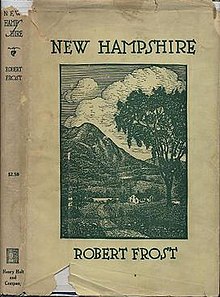
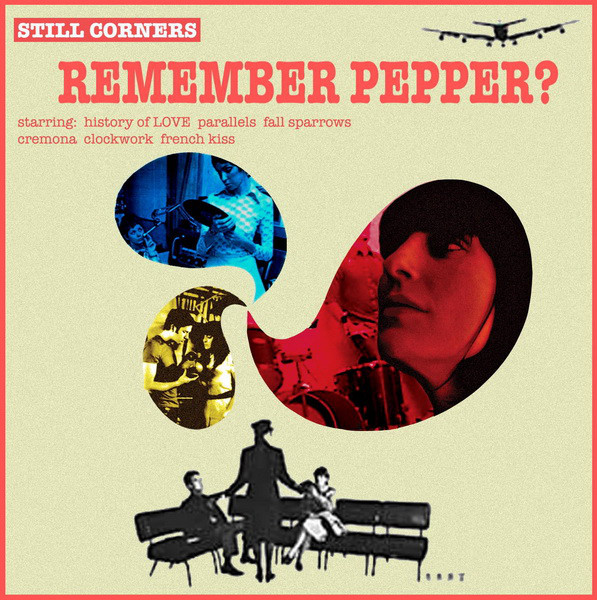

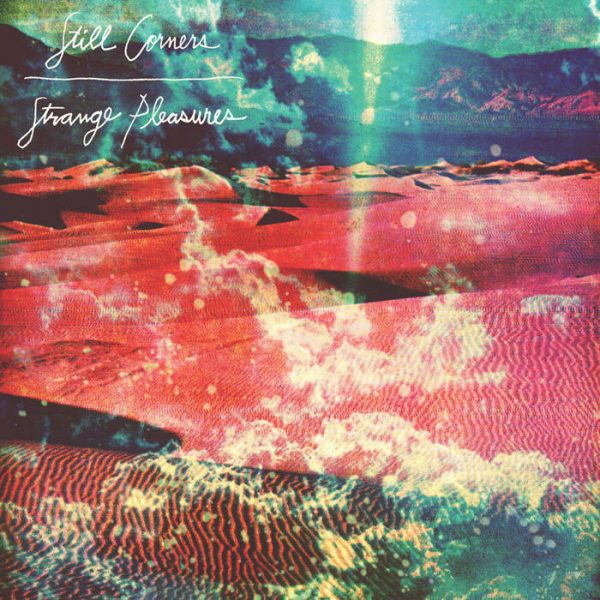
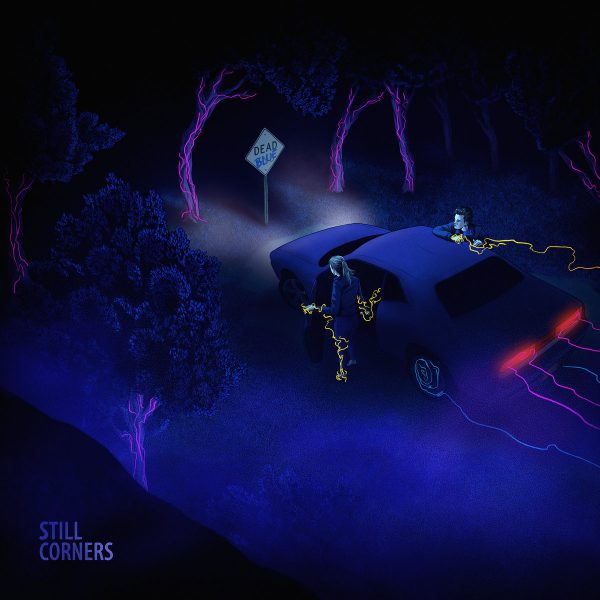
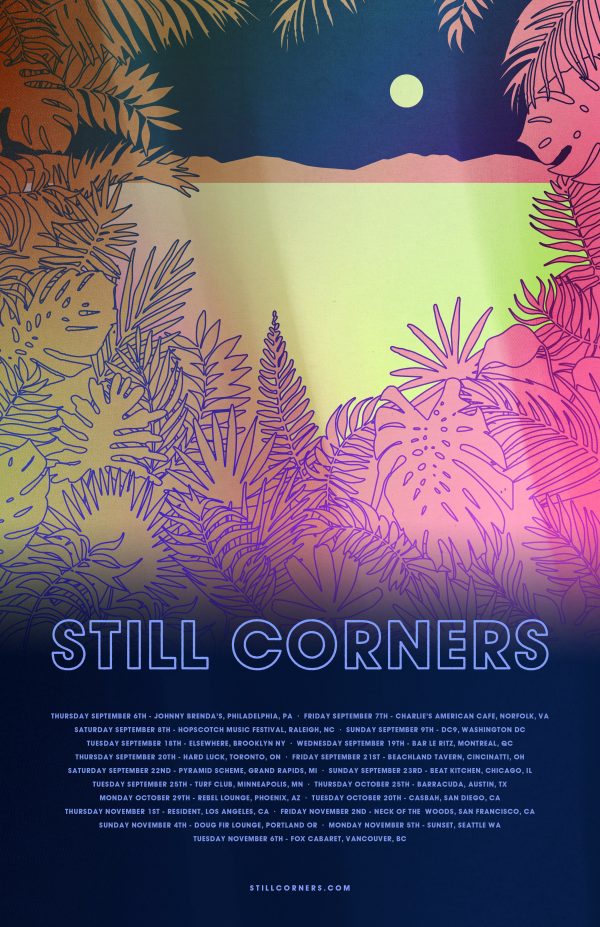
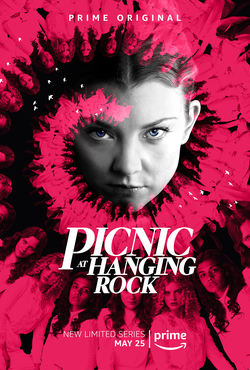
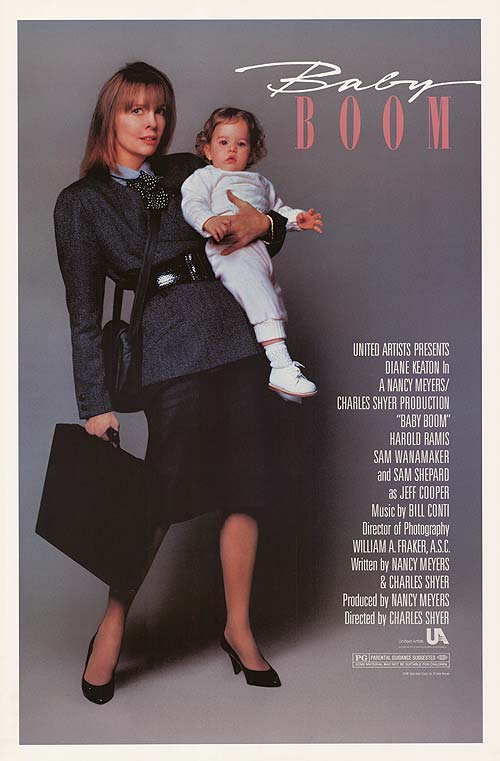
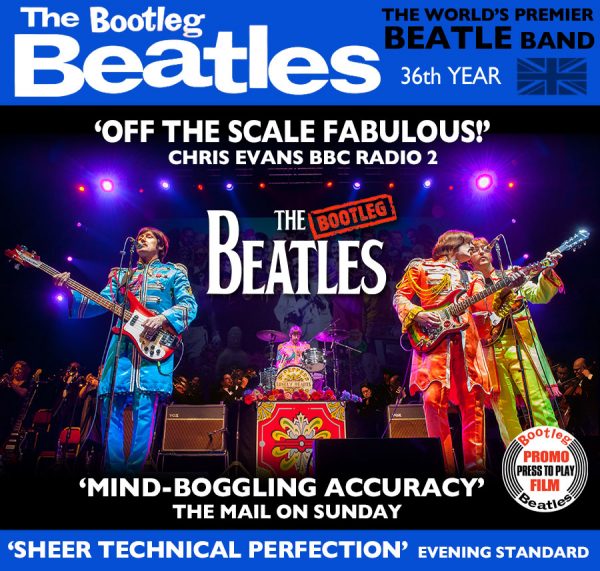


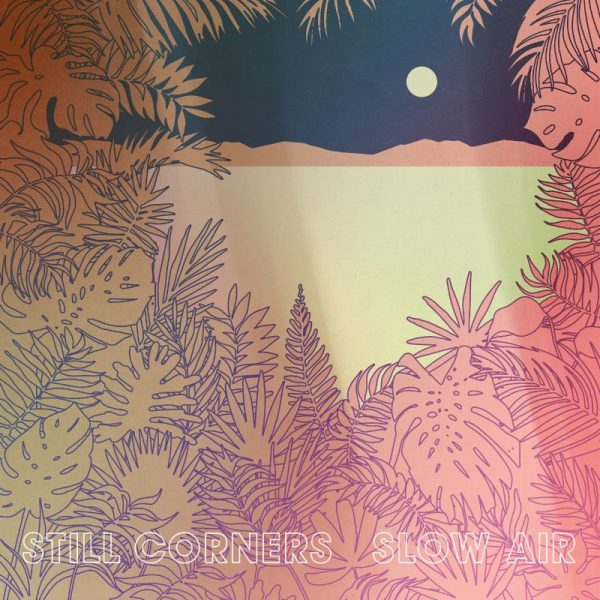
Leave a Reply